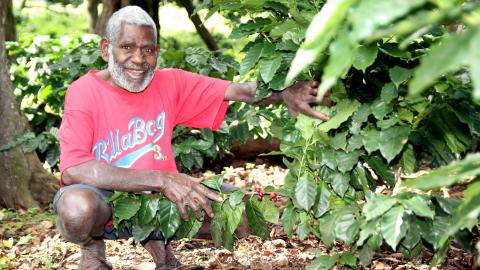
Our approach to building resilient livelihoods
In Vanuatu, lack of income and employment opportunities is a significant challenge in rural and urban communities, especially for women and youth. While a subsistence-focused economy allows rural families to meet most of their basic needs for food and shelter, changing realities mean families struggle to find income to cover other basic needs, such as school fees or savings to respond to natural disasters, while families in urban areas are often engaged in the informal sector. There is a high degree of migration to urban centres to find work, as well as participation in seasonal work overseas, where household members spend months away from family. Rural households have low access to financial services, face poor and expensive access to markets, and often lack access to relevant business support services.
These challenges are compounded by the impact of climate change, with Vanuatu ranked the most vulnerable country globally to natural disasters. The effects of climate change are already changing local weather patterns, and going forward, will impact Pacific island food systems and economies in complex ways.
The impact of COVID-19 on the Vanuatu economy – where tourism makes up 40% of the GDP – is also emerging as a significant challenge. Preliminary results from a Cash Voucher Programme Working Group survey indicate that up to 85% of people have experienced negative economic impact due to COVID-19 and a loss of income. This can include formal job loss in the tourism sector, loss of informal tourism-reliant income (such as transport providers and handicraft sales), and loss of income due to COVID-19 social distancing measures mandated by the government (for example, the number of vendors allowed to sell in public markets at once has been significantly reduced). For the 7,000+ seasonal workers who rely on overseas seasonal work for their livelihoods, border restrictions have had a significant negative impact on them personally, as well as more broadly: a 2019 study of 174 workers found that 87% invested in some type of business or contributed to a family member’s or community business venture. This income and opportunity is now lost.
World Vision works with urban and rural communities, especially with women and youth, to increase access to savings and loans, strengthen small business acumen, and work with smallholder farmers to produce higher quality and quantity yields in market-driven sectors. World Vision supports local producers to establish sustainable market linkages with domestic buyers.